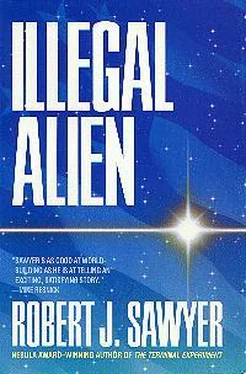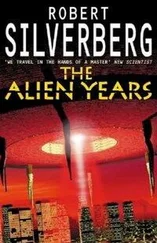Dale frowned. “So you’re saying the light from Centauri B would make things bright, even if the Tosok world orbited a long way from Centauri A?”
“No, no. Even at its closest approach, Centauri B would only appear about one percent as bright as our sun. That’s still thousands of times brighter than our full moon—meaning nights on the Tosok home world when A has set but B is still up are probably reasonably bright, but surely no brighter than our streetlights make our streets.”
“Oh.”
“No, the problem isn’t Alpha Centauri B’s light—it’s its gravity. Clete explained all this in his show. According to celestial mechanics, planetary orbits in a double-star system are stable out to a distance of one fifth the closest approach between the two stars. Since the closest A ever gets to B is eleven AUs, then planetary orbits around A are stable out to just over two AUs—just over twice as far out as Earth is from our sun.”
“But farther out than that, they’re unstable?”
Frank nodded. “And an unstable orbit could be threatening them with extinction. In which case, it’s possible that they’re not just here for a visit. The Tosok race may be looking for a new home.”
“You mean, as in invading ours?”
Frank shrugged. “It’s possible.”
“God.”
“Exactly,” said Frank. “And think about the missing body parts: the eyes are clearly one of our most fragile components. And the throat—you heard what Professor Wills said: the design makes it easy to choke to death. And the appendix, a part that can be made to burst, causing death if not treated immediately.” He paused, and looked at the old lawyer. “You know what Linda Ziegler’s got Packwood Smathers doing: looking for a way to kill a Tosok, should the jury hand down a death sentence. Perhaps the Tosoks were doing something similar: looking for a way to wipe us out, to make room for them to come here.”
The video monitors in Judge Pringle’s courtroom flickered into life again with a view aboard the alien mothership. But this time the images weren’t old tapes—this time, they were a live broadcast…
Francis Antonio Nobilio floated down the dim corridor of the alien ship. It was exhilarating! He felt ten years younger. There had been a hint of nausea at first, but his body had quickly gotten used to the lack of gravity, and now he was enjoying himself thoroughly. The air had a slightly salty taste, as though he were at seaside, and there were several other faint smells. Frank had never noticed a Tosok body odor before, but over the centuries the beings had spent aboard this ship, whatever normally undetectable scent they gave off had been magnified past the threshold of discernibility.
There were lots of sounds. A low-pitched electrical hum, the occasional sloshing of water or other liquids moving through pipes, and a tick-tick-ticking that Kelkad, who was accompanying Frank, said was caused by uneven heating of the ship’s hull as its orbit moved it out of the Earth’s shadow and into direct sunlight.
Frank was carrying a video camera, on loan from Court TV. He also had a radio microphone and earpiece. Kelkad, who was wearing a headset that had been specially adapted for him, had arranged for the signals to be broadcast directly from the ship to the courthouse; the problems that had prevented Calhoun from broadcasting during his original impromptu visit had proven trivial to overcome. Doubtless over a billion people the world over were watching the live broadcast—but the only audience Frank was really interested in consisted of six women and six men in the Los Angeles County Criminal Courts Building. Judge Pringle had told Dale Rice to find a way to bring the evidence there, and Dale had done precisely that.
“Dr. Nobilio,” said Dale’s voice over the radio, “can you hear me?” Frank reached a hand up to adjust his headset.
“Yes.”
“All right,” said Dale’s voice. “The jury is present, and we would like to now continue with the testimony. Captain Kelkad, will you please escort Dr. Nobilio into the Tosok medical facilities?”
“Certainly,” said Kelkad. He gave an expert kick off a wall and headed down the corridor. From underneath, the alien looked a bit like an amputee squid, with his four evenly spaced limbs dangling straight behind his body. Frank struggled to keep the camera steady as he, too, pushed off the wall and tried to head in the same direction. Kelkad managed a pretty straight path down the corridor, but Frank ended up bouncing off of both walls as well as the ceiling and floor. At one point the camera lens ended up jammed directly into one of the circular yellow lights set into the ceiling. Frank mumbled an apology to the people watching back on Earth.
Finally they came to the starship’s sick bay—a room no human had ever seen before, but that the Tosok biochemist Stant had described to Dale during his deposition. In its center was a wide operating pallet, with a trough down its long axis to accommodate an arm. The ceiling sported a mechanical octopus of surgical tools attached to articulated arms—they apparently could be pulled down as required to aid the surgeon. Along the walls were interlocking storage units with hexagonal openings, each about eighty centimeters in diameter. The color scheme was mostly light blue, with silver and red highlights. Rather than the usual ceiling lighting disks, the whole roof seemed to be one giant luminescent panel that glowed yellowish white.
“Thank you,” said Dale’s voice. “Now, Kelkad, I am informed that this is the room in which Hask would have performed the organ harvesting of Seltar, the member of your crew who was accidentally killed, correct?”
Kelkad was floating midway between the floor and ceiling, keeping himself in place with his front hand lightly gripping the operating pallet. His cranial tuft waved forward. “That is correct.”
“Dr. Nobilio,” said Dale, “please pan the camera around the room, and while you do so please describe the room’s level of neatness or disarray.”
Frank moved the camera over the walls and floor, and did a long, slow pan up the length of the operating pallet. “Everything seems immaculate to me,” he said. “There’s no sign of messiness.”
“No blood splatters?” said Dale’s voice. “No evidence of carnage?”
“None.”
“Now, Dr. Nobilio, please show us the storage units mounted in the wall.”
Frank complied. “I would like you to zoom in on the labels on each one, and, Kelkad, I would like you to translate those labels for us.”
Ziegler’s voice over the headsets now: “Objection, Your Honor. Sidebar?”
“You may ap—” Judge Pringle must have killed the microphones; her voice was cut off in mid-word.
Frank, still floating, tried to shrug in Kelkad’s direction. “Sorry about this,” he said.
Kelkad’s topknot rippled. “Your courts do seem to spend an inordinate amount of time on procedural issues.”
“You should try working in government,” said Frank ruefully. “It seems all we do is argue.”
“I thought Mr. Rice said you were an idealist?”
“Compared to Dale, I certainly am. But I’m an idealist in the sense that I believe the ideal is attainable, whether it’s efficient courts or efficient government. And besides—”
“—stand back.” Judge Pringle’s voice again. Whatever legal issue had been raised had apparently now been sorted out. “Mr. Rice, proceed.”
“Thank you, Your Honor. Dr. Nobilio, you were showing us the wall storage units.”
“Oh, sorry.” Frank re-aimed the camera. “How’s that?”
“Fine,” said Dale’s voice. “Captain Kelkad, would you translate?”
Frank realized Kelkad was looking at the upper right unit, while the camera was focused on the upper left—one of those little cultural differences.
Читать дальше











